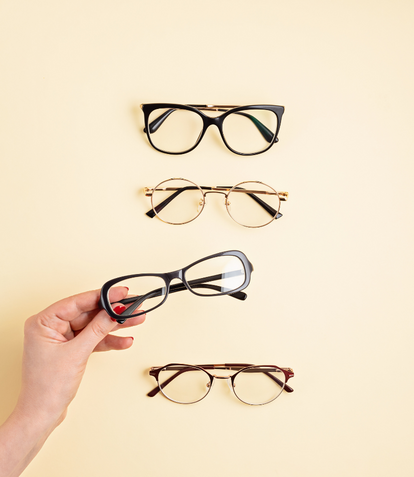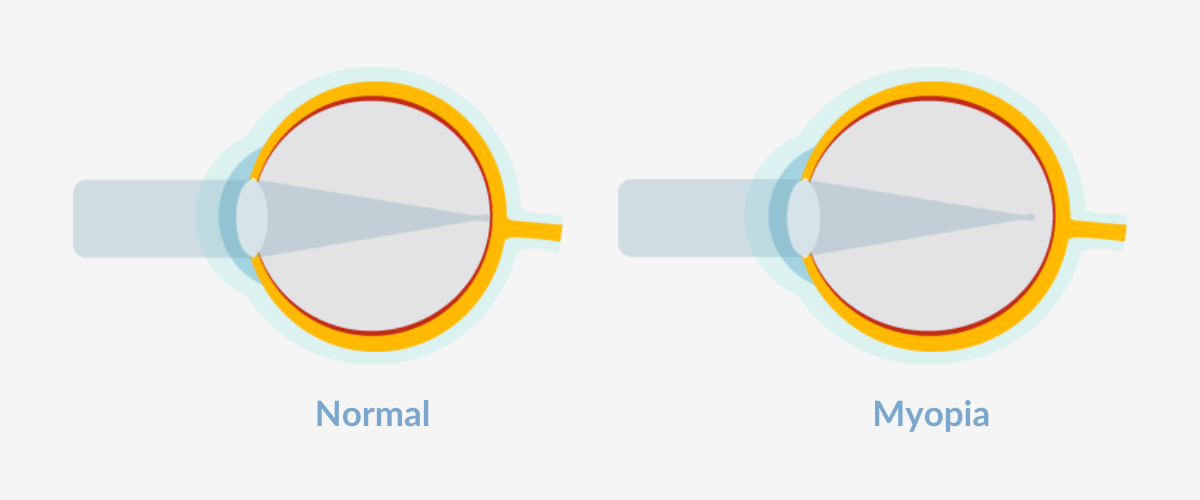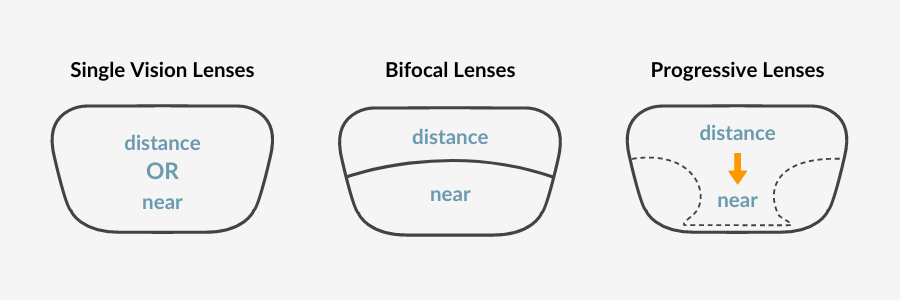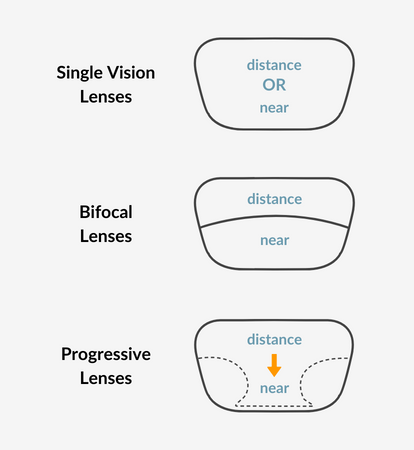

Nearsighted Glasses
If you’re looking into nearsighted glasses, chances are you already know you’re nearsighted and need a pair of specs or want to learn more about the condition. In this article, we’ll explain what nearsightedness is, what to do when suffering from it, and how to choose the best glasses. We’ll also debunk some myths and convictions on nearsightedness so you have all the correct answers to your questions.
Am I nearsighted?
Nearsightedness, technically known as myopia, occurs when you can see objects close up but have difficulty seeing objects that are far away. Suffering from myopia and not being able to see distant objects can lead to headaches, eye strain, and squinting when not seeing correctly. To relieve these symptoms and have good vision, you must see an eye doctor and get an accurate prescription.
Nearsighted vs. farsighted
You can wear glasses for both near and far distances. While nearsightedness occurs when you’re not able to see objects that are far away, farsightedness is the opposite. Being farsighted, or having hyperopia, means you cannot see objects at a close range. Some eye conditions entail that you might need two prescription powers for both myopia and hyperopia. In these cases, bifocal lenses or multifocal lenses are required.
What lenses correct nearsightedness
Nearsightedness is corrected with ‘minus power lenses’ that are concave-shaped and help the eye focus properly. They are called ‘minus’ lenses because they correct myopia by reducing the eye’s focusing power. The power of lenses is measured in diopters; when having myopia, there is a minus before the diopters on the prescription provided by the eye specialist. If you’re having trouble reading your prescription, check out our quick guide or ask our online opticians for help.

What are the best lenses for myopia?
Once you know how to read your prescription and understand your needs, you’ll have to choose the best lens option. Here’s some information to help you with that:
1. Single-vision lenses correct one single visual difficulty. It can be distance, intermediate, or near vision.
2. Bifocals combine two corrective powers: the top half clarifies objects at a distance, and the bottom half clarifies objects close up.
3. Progressive lenses offer the same three correction powers but without the lines across the middle. The different prescriptions blend into one another seamlessly.
To help understand the difference, we’ve covered theree lenses, but it’s worth noting that at SmartBuyGlasses, we only sell single-vision and progressives lenses.

Can you wear nearsighted glasses while reading?
As previously mentioned, nearsighted glasses should help you see objects that are far away, not close up. If you struggle with reading or cannot see objects that are close up, you might also have astigmatism or hyperopia, which means you should speak with a specialist and renew your prescription.
Should I wear distance glasses all the time?
Depending on the severity of your myopia, you may only need glasses for certain activities, such as watching a movie or driving a car. Alternatively, if you are highly nearsighted, you may need to wear them all the time. If you need more clarification about whether you should be wearing your glasses all the time or only for certain activities, consult your eye care specialist.
Can I buy nearsighted glasses over the counter? What are the best options?
Simply put, purchasing nearsighted glasses over the counter is not advised. The main reason is that nearsighted glasses require an eye care specialist prescription. If you don’t want to waste precious time going from store to store to choose a pair of frames, the best online option to buy glasses that will correct your myopia is SmartBuyGlasses. In four easy steps, you’ll get a pair of brand-new specs delivered to your door:
1. The first step to getting a pair of nearsighted glasses is visiting a specialist and renewing your prescription.
2. Secondly, you’ll want to head to our website and browse through thousands of prescription glasses. If you don’t know which one fits best, you can always try the frames virtually with our Virtual Try-On tool!
3. Once you’ve picked your favourite, you’ll want to select your lenses (based on the information provided before, it will be super easy)
4. After selecting the lenses, you will have to provide your prescription information.
Your glasses will be delivered to your door with free shipping in a few days.
If you have more questions regarding nearsightedness or need help reading your prescription, check out our Optical Centre or ask our team of online opticians.
Nearsighted Glasses
If you’re looking into nearsighted glasses, chances are you already know you’re nearsighted and need a pair of specs or want to learn more about the condition. In this article, we’ll explain what nearsightedness is, what to do when suffering from it, and how to choose the best glasses. We’ll also debunk some myths and convictions on nearsightedness so you have all the correct answers to your questions.
Am I nearsighted?
Nearsightedness, technically known as myopia, occurs when you can see objects close up but have difficulty seeing objects that are far away. Suffering from myopia and not being able to see distant objects can lead to headaches, eye strain, and squinting when not seeing correctly. To relieve these symptoms and have good vision, you must see an eye doctor and get an accurate prescription.
Nearsighted vs. farsighted
You can wear glasses for both near and far distances. While nearsightedness occurs when you’re not able to see objects that are far away, farsightedness is the opposite. Being farsighted, or having hyperopia, means you cannot see objects at a close range. Some eye conditions entail that you might need two prescription powers for both myopia and hyperopia. In these cases, bifocal lenses or multifocal lenses are required.
What lenses correct nearsightedness
Nearsightedness is corrected with ‘minus power lenses’ that are concave-shaped and help the eye focus properly. They are called ‘minus’ lenses because they correct myopia by reducing the eye’s focusing power. The power of lenses is measured in diopters; when having myopia, there is a minus before the diopters on the prescription provided by the eye specialist. If you’re having trouble reading your prescription, check out our quick guide or ask our online opticians for help.

What are the best lenses for myopia?
Once you know how to read your prescription and understand your needs, you’ll have to choose the best lens option. Here’s some information to help you with that:
1. Single-vision lenses correct one single visual difficulty. It can be distance, intermediate, or near vision.
2. Bifocals combine two corrective powers: the top half clarifies objects at a distance, and the bottom half clarifies objects close up.
3. Progressive lenses offer the same three correction powers but without the lines across the middle. The different prescriptions blend into one another seamlessly.
To help understand the difference, we’ve covered theree lenses, but it’s worth noting that at SmartBuyGlasses, we only sell single-vision and progressives lenses.

Can you wear nearsighted glasses while reading?
As previously mentioned, nearsighted glasses should help you see objects that are far away, not close up. If you struggle with reading or cannot see objects that are close up, you might also have astigmatism or hyperopia, which means you should speak with a specialist and renew your prescription.
Should I wear distance glasses all the time?
Depending on the severity of your myopia, you may only need glasses for certain activities, such as watching a movie or driving a car. Alternatively, if you are highly nearsighted, you may need to wear them all the time. If you need more clarification about whether you should be wearing your glasses all the time or only for certain activities, consult your eye care specialist.
Can I buy nearsighted glasses over the counter? What are the best options?
Simply put, purchasing nearsighted glasses over the counter is not advised. The main reason is that nearsighted glasses require an eye care specialist prescription. If you don’t want to waste precious time going from store to store to choose a pair of frames, the best online option to buy glasses that will correct your myopia is SmartBuyGlasses. In four easy steps, you’ll get a pair of brand-new specs delivered to your door:
1. The first step to getting a pair of nearsighted glasses is visiting a specialist and renewing your prescription.
2. Secondly, you’ll want to head to our website and browse through thousands of prescription glasses. If you don’t know which one fits best, you can always try the frames virtually with our Virtual Try-On tool!
3. Once you’ve picked your favourite, you’ll want to select your lenses (based on the information provided before, it will be super easy)
4. After selecting the lenses, you will have to provide your prescription information.
Your glasses will be delivered to your door with free shipping in a few days.
If you have more questions regarding nearsightedness or need help reading your prescription, check out our Optical Centre or ask our team of online opticians.






































